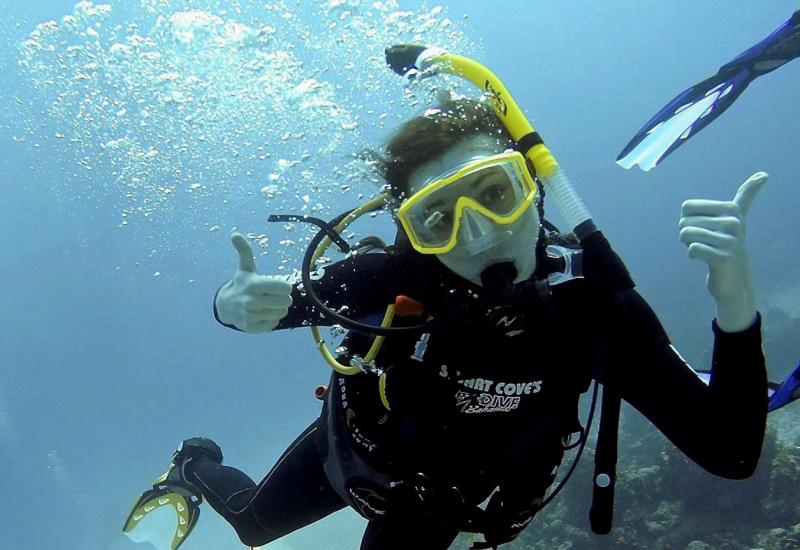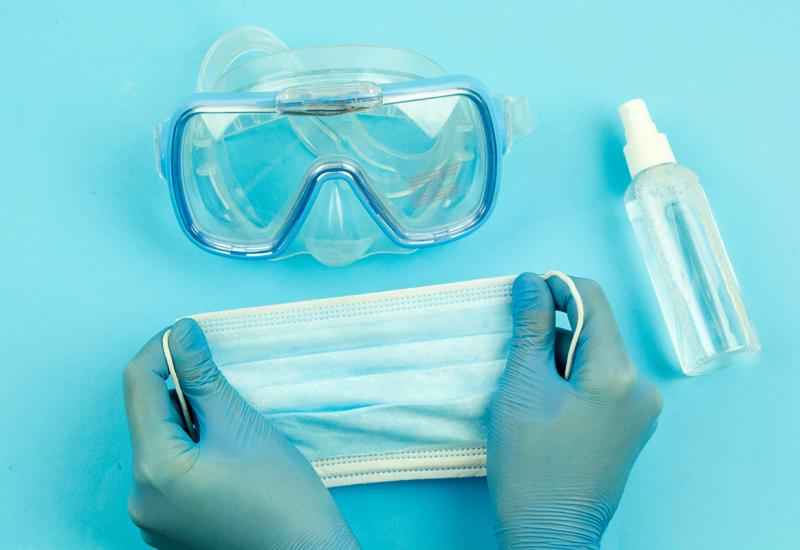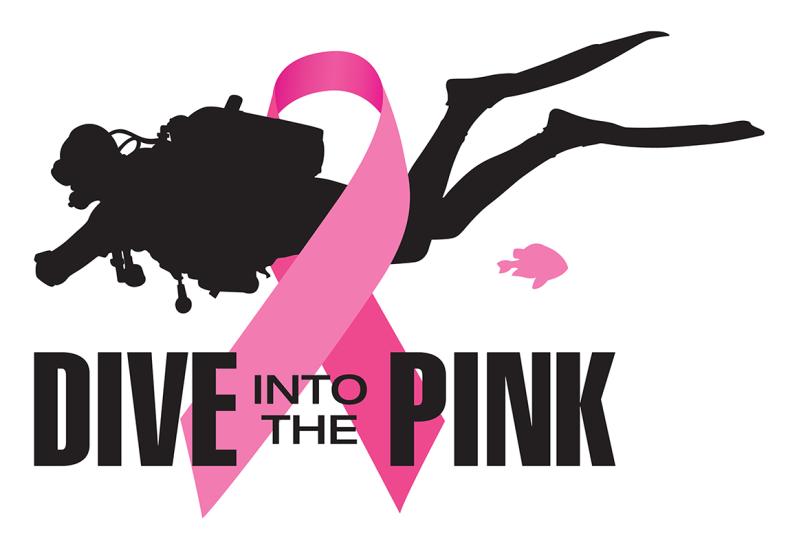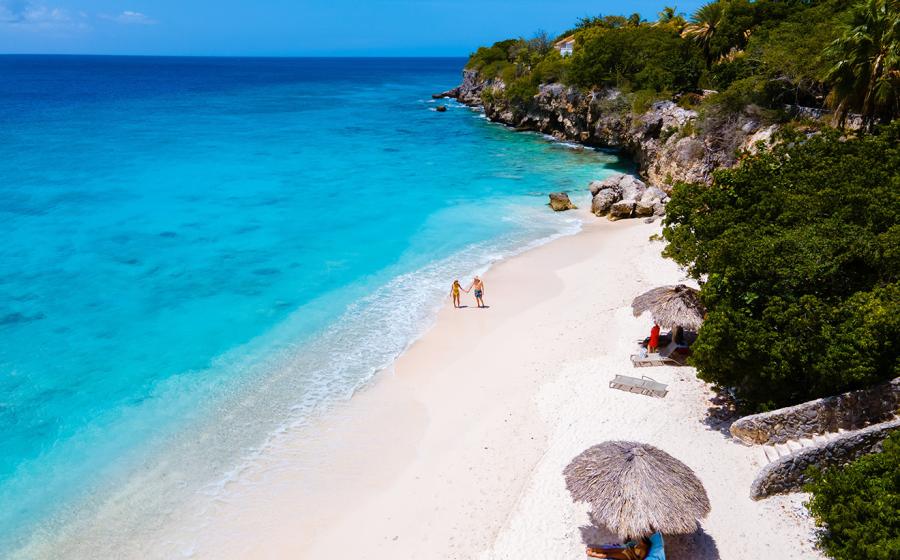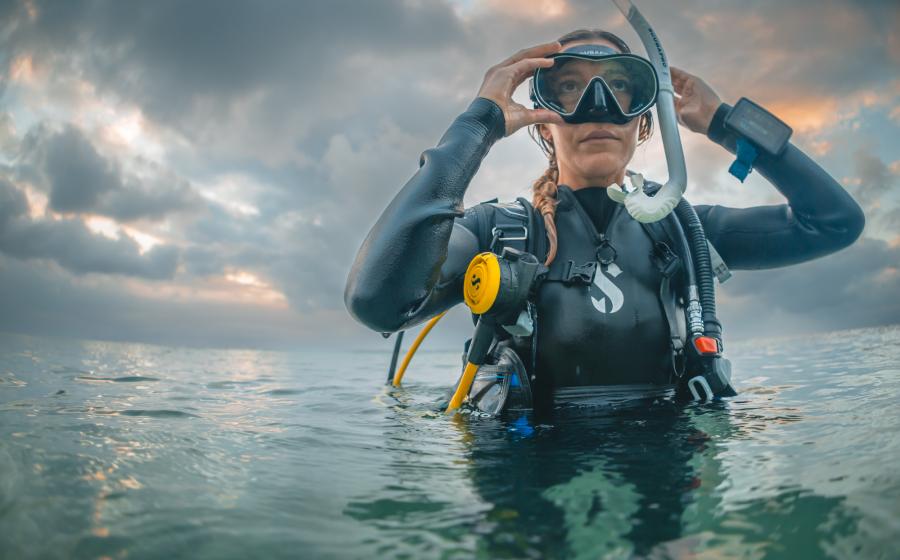Diving Without a Leg To Stand On
September 2001
By Ernest Campbell and Arlene Perlmutter
Can I Dive After a Leg Strain?
I recently strained my leg. I'm supposed to go diving in a couple of days. Should I go?
via e-mail
Leg strains vary in severity and often are associated with blood clots. Some experts believe that there is an increased risk of bubble formation in regions of tissue where there has been some disruption of blood supply. Others say that leg strains generally don't impose any restrictions on diving. A severe strain could sideline you for several months if there are any blood clots. Check with your physician to make sure your strain is a fairly mild one.
There are a couple of other factors to consider:
-
Heavy scuba gear places significant strain on a diver's legs. Getting back into the boat might be a problem. Ask the divemaster if you can remove your gear in the water and hand it to a crew member.
-
There is loss of muscle strength and sometimes actual muscle atrophy with a strain, which can affect your mobility in the water. Make sure you can fin easily in a pool before going diving.
Can I Dive With Anemia?
I have been diagnosed with a genetic type of anemia in which the part of my red blood cells that carries oxygen is abnormally small. This condition didn't stop me from pursuing a basic dive certification at the end of last summer. Now, I am gearing up for a season of diving. Is there any reason that I should be concerned about the anemia when I dive? Are there any precautions I need to take? Or, heaven forbid, should I find a new hobby?
via e-mail
People with anemia, whatever the type, really have an oxygen-carrying problem. You should not dive if the ability of the blood to transport oxygen and off-load carbon dioxide is compromised in any way. You can take a simple blood test to determine your hemoglobin level. If the level is above 13 grams, then it's OK to dive. Diving when your hemoglobin level is below 13 grams puts you at risk of hypoxia and loss of consciousness while under water, which could lead to drowning.
Help--I Throw Up Every Time I Dive!
I become nauseated every time I dive and throw up into my regulator. I feel like I have altitude sickness. What's causing this?
via e-mail
There could be several things causing your nausea:
-
Swallowing air at depth while clearing your ears can cause nausea without other symptoms. This air enlarges on ascent and can produce nausea.
-
Nausea without vertigo and occurring only during the dive can be caused by a hyperactive gag reflex from the regulator mouthpiece.
-
Nausea with vertigo is usually caused by alternobaric vertigo from unequal pressures between the ears.
-
Surge or wave action under water can cause motion sickness, though you most likely would have had nausea on board the boat as well.
-
Nausea can be a nonspecific symptom of a decompression accident to the inner ear, but would occur generally on ascent and would be associated with vertigo.
Can I Dive After a Root Canal?
I heard a strange rumor that you should not dive for two weeks after getting a root canal--that on ascent, your tooth could explode or pop off. Is this true?
via e-mail
Your concern is not a rumor. If there is any air left in the end of the root canal, this air could implode on descent or do just the opposite on ascent. The air is subject to all the forces of Boyle's Law, just as any other air-containing structure in the body (sinuses, ears, lungs, intestine).
If you are about to have a root canal or if you've just had one, follow these recommendations:
-
All canals must be filled to the top to avoid accumulation of compressed gases and pain, especially on ascent.
-
Try to finish the root canal in one visit. Multiple visits require the dentist to place a temporary filling over a cotton pellet in your mouth.
-
If multiple visits are required, and cotton must be put into the tooth, do not dive. Diving must wait until all air spaces or potential air spaces are closed. Diving with an air space can lead to the implosion of the tooth.
-
Once the root canal is finished, the dentist will fill the space with temporary cement and no air spaces. Following a root canal, a cap (crown) is placed on the tooth.
-
Wait to dive for a period of two weeks or until there is evidence of complete healing without air pockets.
Is Your Mouthpiece Causing You Pain?
by Arlene Perlmutter
Does your jaw hurt after you dive? If it does, your mouthpiece could be to blame. Standard scuba mouthpieces are constructed so that a diver has to bite on two platforms to hold the mouthpiece and demand valve in place. This design forces a diver to hold the mouthpiece in an abnormal jaw position for an extended period of time, which can cause problems with your temporomandibular joints (TMJ) and muscles that control the joints. These joints connect your jaw to your skull, while your muscles attach the bones and joints and help them move. If you have TMJ dysfunction, you may experience headaches; pain while chewing; problems opening or closing your mouth; jaw locking; pain in your face, neck or shoulders; or painful clicking, grating or popping in your jaw.
TMJ dysfunction is especially problematic for divers who suffer from TMJ problems when they're not diving. The mouthpiece can exacerbate the problem. Also, divers who experience anxiety while diving are also at a greater risk of suffering from this problem. When a diver is stressed under water, there is a tendency to clench the mouthpiece.
Researchers have conducted experiments with different types of mouthpiece designs to find out which type provides the most comfort and causes the least muscular effort, fatigue and pain. They have found that standard mouthpieces can cause jaw problems and recommend that divers, particularly those who already suffer from TMJ problems, have a mouthpiece custom-made. If you decide to have one made, it should be thoroughly tested before you enter the water. If you suspect you have TMJ dysfunction, talk to your doctor about your symptoms.
True or
by Arlene Perlmutter
What are the risks of diving with a cold or the flu? Take our quiz to test your knowledge.
1) Taking a decongestant for a cold will allow you to equalize your ears and sinuses without any problems. True or False?
2) A diver will frequently experience a reverse squeeze during ascent, regardless of congestion problems. True or False?
3) When diving with a cold or flu, you increase your risk of losing your regulator and inhaling water. True or False?
4) There is very little risk of serious medical problems resulting from an inability to equalize on descent or ascent. ****
September 2001
By Ernest Campbell and Arlene Perlmutter
Can I Dive After a Leg Strain?
I recently strained my leg. I'm supposed to go diving in a couple of days. Should I go?
via e-mail
Leg strains vary in severity and often are associated with blood clots. Some experts believe that there is an increased risk of bubble formation in regions of tissue where there has been some disruption of blood supply. Others say that leg strains generally don't impose any restrictions on diving. A severe strain could sideline you for several months if there are any blood clots. Check with your physician to make sure your strain is a fairly mild one.
There are a couple of other factors to consider:
Heavy scuba gear places significant strain on a diver's legs. Getting back into the boat might be a problem. Ask the divemaster if you can remove your gear in the water and hand it to a crew member.
There is loss of muscle strength and sometimes actual muscle atrophy with a strain, which can affect your mobility in the water. Make sure you can fin easily in a pool before going diving.
Can I Dive With Anemia?
I have been diagnosed with a genetic type of anemia in which the part of my red blood cells that carries oxygen is abnormally small. This condition didn't stop me from pursuing a basic dive certification at the end of last summer. Now, I am gearing up for a season of diving. Is there any reason that I should be concerned about the anemia when I dive? Are there any precautions I need to take? Or, heaven forbid, should I find a new hobby?
via e-mail
People with anemia, whatever the type, really have an oxygen-carrying problem. You should not dive if the ability of the blood to transport oxygen and off-load carbon dioxide is compromised in any way. You can take a simple blood test to determine your hemoglobin level. If the level is above 13 grams, then it's OK to dive. Diving when your hemoglobin level is below 13 grams puts you at risk of hypoxia and loss of consciousness while under water, which could lead to drowning.
Help--I Throw Up Every Time I Dive!
I become nauseated every time I dive and throw up into my regulator. I feel like I have altitude sickness. What's causing this?
via e-mail
There could be several things causing your nausea:
Swallowing air at depth while clearing your ears can cause nausea without other symptoms. This air enlarges on ascent and can produce nausea.
Nausea without vertigo and occurring only during the dive can be caused by a hyperactive gag reflex from the regulator mouthpiece.
Nausea with vertigo is usually caused by alternobaric vertigo from unequal pressures between the ears.
Surge or wave action under water can cause motion sickness, though you most likely would have had nausea on board the boat as well.
Nausea can be a nonspecific symptom of a decompression accident to the inner ear, but would occur generally on ascent and would be associated with vertigo.
Can I Dive After a Root Canal?
I heard a strange rumor that you should not dive for two weeks after getting a root canal--that on ascent, your tooth could explode or pop off. Is this true?
via e-mail
Your concern is not a rumor. If there is any air left in the end of the root canal, this air could implode on descent or do just the opposite on ascent. The air is subject to all the forces of Boyle's Law, just as any other air-containing structure in the body (sinuses, ears, lungs, intestine).
If you are about to have a root canal or if you've just had one, follow these recommendations:
All canals must be filled to the top to avoid accumulation of compressed gases and pain, especially on ascent.
Try to finish the root canal in one visit. Multiple visits require the dentist to place a temporary filling over a cotton pellet in your mouth.
If multiple visits are required, and cotton must be put into the tooth, do not dive. Diving must wait until all air spaces or potential air spaces are closed. Diving with an air space can lead to the implosion of the tooth.
Once the root canal is finished, the dentist will fill the space with temporary cement and no air spaces. Following a root canal, a cap (crown) is placed on the tooth.
Wait to dive for a period of two weeks or until there is evidence of complete healing without air pockets.
Is Your Mouthpiece Causing You Pain?
by Arlene Perlmutter
Does your jaw hurt after you dive? If it does, your mouthpiece could be to blame. Standard scuba mouthpieces are constructed so that a diver has to bite on two platforms to hold the mouthpiece and demand valve in place. This design forces a diver to hold the mouthpiece in an abnormal jaw position for an extended period of time, which can cause problems with your temporomandibular joints (TMJ) and muscles that control the joints. These joints connect your jaw to your skull, while your muscles attach the bones and joints and help them move. If you have TMJ dysfunction, you may experience headaches; pain while chewing; problems opening or closing your mouth; jaw locking; pain in your face, neck or shoulders; or painful clicking, grating or popping in your jaw.
TMJ dysfunction is especially problematic for divers who suffer from TMJ problems when they're not diving. The mouthpiece can exacerbate the problem. Also, divers who experience anxiety while diving are also at a greater risk of suffering from this problem. When a diver is stressed under water, there is a tendency to clench the mouthpiece.
Researchers have conducted experiments with different types of mouthpiece designs to find out which type provides the most comfort and causes the least muscular effort, fatigue and pain. They have found that standard mouthpieces can cause jaw problems and recommend that divers, particularly those who already suffer from TMJ problems, have a mouthpiece custom-made. If you decide to have one made, it should be thoroughly tested before you enter the water. If you suspect you have TMJ dysfunction, talk to your doctor about your symptoms.
True or
by Arlene Perlmutter
What are the risks of diving with a cold or the flu? Take our quiz to test your knowledge.
1) Taking a decongestant for a cold will allow you to equalize your ears and sinuses without any problems. True or False?
2) A diver will frequently experience a reverse squeeze during ascent, regardless of congestion problems. True or False?
3) When diving with a cold or flu, you increase your risk of losing your regulator and inhaling water. True or False?
4) There is very little risk of serious medical problems resulting from an inability to equalize on descent or ascent. ****

